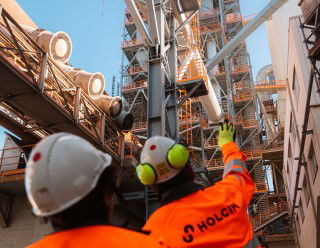The construction of Indonesia's new capital project, Ibu Kota Nusantara (IKN) in East Kalimantan on Borneo is moving ahead at pace. The first phase of the new city is scheduled to be completed as early as 2024, and while Indocement is focussed on supplying 'green' cement products for the project, another leading indonesian cement producer, Semen Indonesia Group (SIG), is more occupied with optimising its own production and distribution facilities, and capitalising on export opportunities.
The reason for the new capital project is that Indonesia's current capital, Jakarta, is currently 40 per cent below sea-level and is sinking at a rate of 15cm annually. Jakarta will see investment in the construction of a Giant Sea Wall, described as a three-layered sea wall, with the outer layer acting as a causeway and breaker stretching for 29 miles. While it is hoped that the wall will stave off rising sea levels, the new capital of IKN will see huge infrastructure spending. Indonesian cement demand will also be boosted by continued demand for housing with a current backlog of around 12.75m units.
Indonesia's President, Joko Widodo, intends for IKN to be a smart city and a green utopia that will span approximately 256,142ha of land and a water area of 68,189ha. "Energy sources in the new Indonesian capital will come from renewable energy. For transportation, the government will develop electric-based autonomous vehicle technology. Pedestrians and cyclists will appreciate it most. The distance everywhere can be 10 minutes," said Mr Widodo.
The construction of IKN will require 21Mta of cement for the next 20 years, according to Indonesia's Bandung Institute of Technology. The government has allocated IDR27trn (US$1.8bn) in the state budget for 2023 for the development of IKN and between IDR27-30trn in the following year. Over the next two years, the construction includes the building of a new presidential palace, the States Housing Building, and housing for 500,000 civil servant residents. The project has targeted a 60 per cent increase in energy efficiency in new public buildings by 2045 and net zero emissions by the same year. There will be a balanced housing ratio of 1:3:6 for luxury, medium and affordable housing. The total project is estimated to cost approximately US$32bn and it will take until 2039 for the first two million people to settle in the new capital with 2045 scheduled as the city's completion date.
Indocement plans
Indocement (Heidelberg Materials) has a strategic position in supplying cement to IKN because it has a 3.27Mt factory in Tarjun, Kalimantan. Indocement Director and Corporate Secretary, Antonius Marcos, said the company would focus on the main market share, namely Jabodetabek (Metropolitan Jakarta) and South Kalimantan. Indocement will also boost market share in eastern Indonesia.
"We have and will run programmes to work in this market. In boosting market share in eastern Indonesia, Indocement has collaborated with PT Semen Bosowa Maros, and other cement terminals. Through this collaboration, Indocement is also targeting an increase in foreign or export market share," Mr Marcos said.
SIG awaits lifting of plant moratorium
Meanwhile, SIG is not likely to contribute as much to the construction of IKN. "In East Kutai. I’m afraid Semen Indonesia (SIG) will only be a spectator… Until 2030, there is no need to build a new cement factory," said Andre Rosiade, member of the Commission VI of the Republic of Indonesia DPR.
SIG has steered a course that will strengthen its presence in the domestic market without needing to add new capacity. "Demand in the export market is still very high with current prices quite attractive," said Vita Mahreyni, SIG's company secretary, last year.
Donny Arsal, the main director of SIG, said there is an excess of cement capacity in the country of around 53.8Mta and, in 2022 national demand was estimated at 65.2Mt. He hoped that the moratorium on the construction of new cement plants since 2020 might be lifted so that the work on the proposed 9Mta of new capacity can begin. "In the future demand growth, we hope the gap will get smaller. We estimate that in 2030 it will be 18.1Mt. So there is still oversupply, but it's getting smaller and smaller," he said.
Exceptions to the rule
However, despite the moratorium, in Aceh and East Kutai the construction of two cement factories continues, according to Mr Rosiade. From this, CemNet believes that PT Semen Indonesia Aceh's 1.5Mta integrated plant in Aceh, which was suspended during the COVID-period, may well have resumed construction. Meanwhile, the huge 8Mta greenfield plant in East Kutai is being carried out by PT Kobexindo Cement. China-based Hongshi Holdings is collaborating with PT Kobexindo Cement on the project and the investment is estimated between IDR14trn-27trn. The PT Kobexindo Cement plant is expected to become the main supplier plant for the on-going construction of IKN city over the next three decades.
Summary
With cement capacity reaching historic highs of 119.1Mta in Indonesia, only China and India now produce more cement in the world. The IKN project will release some of the overcapacity and domestic demand is expected to rise in the post-pandemic period. Cement producers are being held by the Ministry of State Enterprises (Kementerian Baden Usaha Milik Negara) to the no-build policy until cement demand rises further, but two projects have proven exceptions to this ruling.
